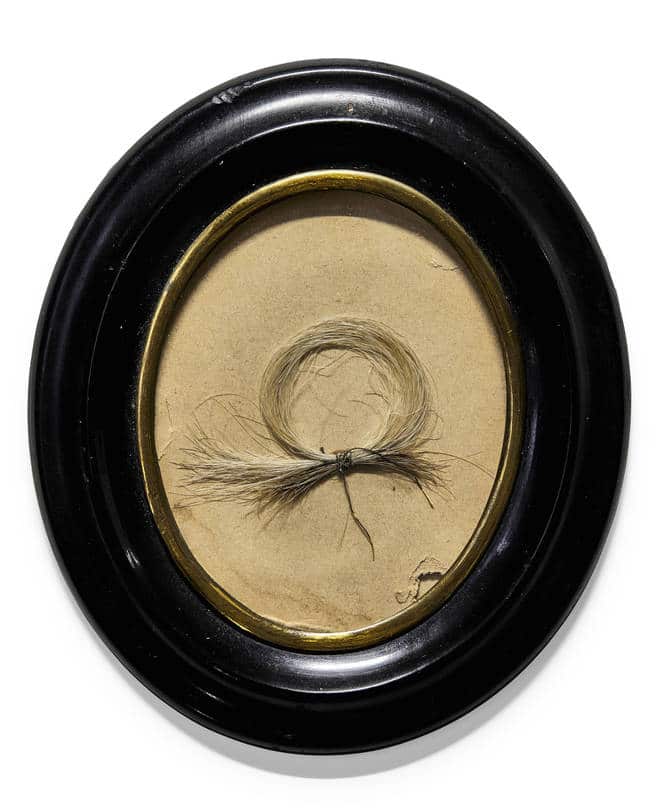New research: the curious cause of Beethoven’s death
NewsGenomic analysis of eight verified locks of Beethoven’s hair clarifies the diagnosis of his fatal illness. The reearch, published in Current Biology, indicates ‘a genetic predisposition for liver disease’ and ‘a likely hepatitis B infection’ in the months before his death in March 1827.
None of this will surprise Beethoven scholars, some of whom blame his liver disease, without foundation, on alcohol abuse. Nor is this latest genome evidence entirely conclusive. It does not, for example, explain persistent intestinal complaints throughout his adult life, or the urinary retention that plagued his final days (as detailed in Why Beethoven).
What is intriguing, perhaps explosive, is the discovery of an intruder in Beethoven’s paternal lineage. Specifically, according to Current Biology, ‘we conclude that the most plausible explanation for our observations entails that at least one extra-pair paternity (EPP) event occurred on Beethoven’s direct paternal line, between the conception of Aert van Beethoven’s son Hendrik in Kampenhout, Belgium, in c.1572, and the conception of Ludwig van Beethoven seven generations later in 1770, in Bonn, Germany.’
This tends to reinforce modern suppositions that part of Beethoven’s ancestry was non-European, probably North African. It also contributes to our understanding of his own sense of non-typicality and outsiderness.
There are further reports on the research in general media.







https://www.cell.com/current-biology/fulltext/S0960-9822(23)00181-1
I too searched out the full paper earlier today at cell.com after CNN released a short blurb. It was a long and interesting read. When I popped on here this evening it was clear Norman posted his article without reading the actual full paper as Norman points to non-European ancestry but the scientific results based on the DNA concluded 99% European.
Fascinating. What of the earlier evidence presented some years ago, also based on examination of hair samples, for excess lead and the suggestion that Beethoven’s consumption of wine from lead-lined containers might have been the culprit?
Never mind. The article shows that that lock was inauthentic. (Of the 8 locks studied, only 5 are authentic.) The authentic locks show no excess lead.
Uh … if you read one of the articles in its entirety you will learn that the leaden locks were identified with current technology as those of a woman … it’s a long story …
That was from a hair sample that turned out not to be Beethoven’s.
That only means all those things can be true simultaneously. All I know is that he would have suffered tremendously and had no painkillers to help. That thought is upsetting to me, especially when you consider he ploughed on with composing miraculous music!
Yes lead from wine and Spa water is already evidenced.
Paget’s Disease is also indicated.
They examined hair samples from multiple sources and found that the lead-affected hair was actually from a woman, and therefore definitely not from LvB.
5 of 8 samples were matching (and male), leading the researches to conclude that those were in fact from Beethoven.
Note that the researchers identified the Beethoven samples as “99% European” which would seem to close the door on North African ancestry.
With the Dutch East India Company in the ascendant during some of those generations anything is possible!!
Nothing can be discounted, nor should it be.
Actually, the genetic data can discount it: see Figures S4 and S5 in the article.
Of course, genealogy cannot explain genius; what matters is the individual, not their ancestry.
Better not woke them up.
No, the report specifically ruled OUT African ancestry.
Alas, Black Beethoven would get a lot more respect these days than White Beethoven.
That is more of a reflection of modern stupidity than worldly reality.
Looks like the racial hucksters will have to be satisfied with the juvenile dribblings of St. George and diet-Dvorak Price.
“This tends to reinforce modern suppositions that part of Beethoven’s ancestry was non-European, probably North African.”
No it doesn’t. Neither the Guardian nor New York Times articles make this conclusion.
Apparently it was fate knocking on the door of the pub.
Scientists: Beethoven’s DNA is >99% European, most closely matching North Rhine-Westphalia.
Norman Lebrecht: That means he must’ve had North African ancestry!
Current Biology is not the Lancet or BMJ or a Virology journal. I would think it that if he had Hepatitis it would be the one contracted from food or water Hepatitis A more probable.
Hepatitis B is a liver infection that is spread through blood, semen and vaginal fluids. The chance of getting it in the UK is low. There’s a vaccine if you’re at high risk or travelling to a country where it’s more common.
The infection usually only lasts for a few months, but some people can have hepatitis B long-term.
How you can get hepatitis B
Hepatitis B is caused by a virus that is spread through blood, semen and vaginal fluids.
You can get hepatitis B from:
Having vaginal, anal or oral sex without using a condom or dam
injecting drugs using shared needles
being injured by a used needle
having a tattoo or piercing with unsterilised equipment
having a blood transfusion in a country that does not check blood for hepatitis B. Blood transfusions in the UK are checked for hepatitis B.
Francois Mai has a paper reviewing his medical history. His book Diagnosing genius is worth reading. Beethoven also suffered from lead poisoning, from cheap wine.
There is evidence for Paget’s Disease which fits his medical history. During his exhumation his tempral bones were removed and disappeared (Dr Wagner?), his autopsy in latin has been translated, again shows alcohol induced cirrhosis, no evidence of Syphilis as he was not treated with Mercury.
https://www.rcpe.ac.uk/sites/default/files/t_100506_a_mai.pdf
Reiter & Prohaska suggest possible malpractice in Beethoven’s treatment, given that medicine in 1820s was rather primitive, especially treatment and diagnosis. Beethoven underwent several procedures to drain ascites fluid, which did lead to an infection. Antisepsis was not practiced until Lister et al, Hep B could have been due to unsterilized instruments, eg the tube used to drain Ascites fluid, which is previously documented.
An account is described by Gerhard von Breuning’s book Memories of Beethoven, between 20 December 1826 to 27 February 1827, Dr Johann Seibert, Vienna General Hospital, carried this procedure out.
https://link.springer.com/content/pdf/10.1007/s10354-021-00833-x.pdf?pdf=core
This translation of a medical history symposium, covers his history in the context of clinical practice, ENT etc. Very primitive in 1820s. Oscar Wilde’s father Sir William Wilde was an ENT pioneer, my mentor T. G. Wilson an ENT consultant in Dublin, wrote an account of Sir William Wilde, in his book Victorian Doctor.
https://www.bthvn2020.de/fileadmin/user_upload/Download/Ergebnisse_des_Symposiums_englisch.pdf
Oiseth reviews the original autopsy findings in the context of modern practice. I am more convinced by the evidence of lead poisoning which was common in 1800s, lead salts were added to wine to “improve” it. Also spa water which he drank. The indication of Paget’s disease is also likely as it fits his history more closely.
https://www.researchgate.net/publication/283306115_Beethoven%27s_autopsy_revisited_A_pathologist_sounds_a_final_note
At least the findings of this report do not show any evidence Beethoven was related in any way to either Boris Johnson, Sunak Jeremy Hunt or Matt Hancock!
You have to remember that in 1800, living conditions, food & water were very problematic. Housing had no central heating, damp conditions, TB was rife, Beethoven’s brother Karl died of it.
Food and drink were often adulterated, eg cheese, wine, eggs, with lead salts, malachite green, dyes. Public health did not exist. We know Beethoven consumed large amounts of Spring water (source could be contaminated), wine had lead salts to “tart it up”, Spa water contained lead and other ions.
All these combined with his clinical aetiology, would not make his health better. Medicines prescribed often did more harm, since they had no pharma sector, QA, or RCTs to evaluate them properly.
The germ theory of disease had not yet been discovered until Pasteur, Lister et al. Even minor ops were risky then, no antibiotics or antisepsis procedures. I am amazed that Siebert dared to carry out an Ascites fluid drain for his dropsy.
A definitive analysis would be needed to confirm this. Those samples could be from anyone as folk like Schindler may have been selling free samples! Bone and skull fragments from exhumation would be much better. However it is well known that during the 19th century Resurrectionists often dug up celebrities to sell to medical schools, collectors etc.
The Cell article goes into the question of authentic versus fake hair samples in some detail. The hair with significant lead content is not Beethoven’s (it’s from a woman), so that whole line of argument is faulty.
Given the confusion over those claimed Beethoven skull fragments I would doubt these samples are from Beethoven at all.
(1) Hair, not skull.
(2) The article traces the provenance of the 8 locks very carefully. The provenance of one lock is absolutely rock-solid, and 5 of the 8 locks conformed genetically to the extent that they could be determined as coming from the same person.
There’s always room for doubt, but in this case, there’s not much room…
If Beethoven did have a “sense of non-typicality and outsiderness”, wouldn’t an alcoholic grandmother (who went into rehab) and alcoholic and abusive father be more likely factors than a possible extra-marital affair far back in his ancestry which he almost certainly did not know about? Beethoven himself was a heavy drinker – whether an alcoholic or not.
Stevens, cites a fascinating patient case report which appeared in Italy in 2021, that dramatically emphasized the relationship that lead has to Beethoven’s deafness.
A 64-year-old woman presented with a slowly progressive hearing loss. She also complained of abdominal pain and tingling in her upper extremities like Beethoven.
An audiogram showed a moderately severe hearing loss. Elevated levels of lead were found in her blood and urine.
An examination of possible lead sources revealed that she used a cooking pan with a worn ceramic surface that released lead into her food.
She subsequently underwent chelation with ethylenediaminetetraacetic acid disodium salt which was injected into her to bind to the lead and allow it to be excreted from the body.
After 1 year, her symptoms had all resolved, and her hearing was stabilized.
https://cdn.intechopen.com/pdfs/80189.pdf
I don’t have François Martin Mai’s book to hand but I believe he points out that there is no evidence that Beethoven suffered from wrist drop, a symptom of lead poisoning.
Beethoven liked wine which was laced with lead acetate, which was used to sweeten it. Even the Romans drank it. I can send you the Mai paper.
Hepatitis B was only discovered in 1965. Francois Mai suggests problems with hair analysis, contamination of samples. Also in lead analysis, better to measure lead content in skeletal remains. Lead usage was common in a wide range of products then, including hair and skin cream, used to sweeten wine, lead acetate.
https://www.rcpe.ac.uk/sites/default/files/t_100506_a_mai.pdf
Beethoven was buried initially in the Währinger Ortsfriedhof in 1827. He was subsequently exhumed twice. The first time in 1863, when his body was transferred to a metal coffin, during which time, someone removed his temporal bones.
When the Währinger Ortsfriedhof closed in 1873, he was moved to the Zentralfriedhof in 1888, when Anton Bruckner attended losing his glasses in the grave and asking his skull why he was so deaf!
I think it is time that someone applied for an exhumation order and carried out a full forensic examination and analysis of his remains, especially lead analysis. That is assuming his remains are genuine and not a substitute. The 19th century had a plague of Resurrectionists notably Burke and Hare, which finally ended in GB when the Anatomy act was passed in 1832.
How has the provenance of these hair samples been validated? Without proper validation any DNA analysis is meaningless, besides the samples would have already been contaminated anyway, since forensic specimen preservation was not practised.
I recall when he died, a crowd of folk came into his digs to cut his hair off, to sell as macabre souvenirs. Like the selling of John the Baptist’s fingers to pilgrims in the Middle ages.
The note “without foundation” can only be meant in jest. Beethoven’s regular alcohol consumption has already been documented 15 years ago. https://www.academia.edu/28241526/Medical_Review_on_the_Final_Stage_of_L._van_Beethoven_s_Life